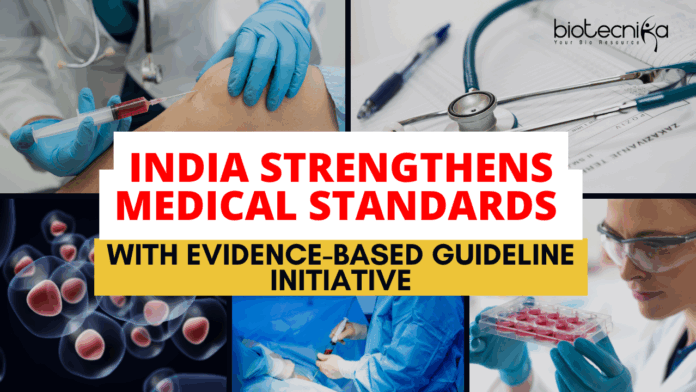India Moves Towards Better, Fairer Healthcare in India with New Guidelines Centre
To make healthcare more reliable and equal across the country, the Department of Health Research (DHR), under the Ministry of Health and Family Welfare, launched the Centre for Evidence-Based Guidelines (CEG). This national-level initiative is designed to help doctors and health workers follow clear, research-based advice while treating patients, so that whether you’re in a metro city or a small town, you get the same quality of care.
The Centre officially started in February 2023. It’s part of a broader vision outlined in the National Health Policy 2017, which calls for care based on strong scientific evidence. Now, the Centre is at the heart of efforts to make healthcare in India more efficient and outcome-driven.
A Step Closer Toward Smarter Health Decisions
The Centre has been given a big responsibility: to create national clinical and public health guidelines that are rooted in solid research. One of the main tools it uses is called the GRADE method (Grading of Recommendations, Assessment, Development, and Evaluation), which helps ensure that every recommendation is built on trusted data.
“We want to make sure that people across India get care based on the best available evidence,” said a senior DHR official.
To make this happen, the Centre brought together 27 Technical Resource Centers (TRCs) and 5 Technical Resource Hubs (TRHs) across top institutions like AIIMS, PGIMER, NIPER, CMC Vellore, and ICMR institutes. These centers focus on different areas like child health, pharmacy, infectious diseases, dentistry, neurology, and public health, covering a wide range of medical needs. This makes India move towards better, fairer healthcare with new guidelines
Training the Next Generation
Creating strong guidelines isn’t enough. The Centre also focuses on training doctors, researchers, and students in how to analyze scientific research and make sense of it. This helps them play an active role in building and updating these guidelines.
Several hands-on training sessions and workshops have already been held:
- In August 2024, a two-day workshop in Delhi taught 25 research teams how to develop guidelines for lung cancer using the GRADE method.
- Similar workshops took place at PGIMER Chandigarh, ICMR-RMRC Bhubaneswar, and ICMR-RMRC Gorakhpur, helping MPH scholars and young researchers learn how to conduct systematic reviews and meta-analyses.
- The Centre also trained public health students from AIIMS Jodhpur in areas like health technology assessment, ethics in medicine, and evidence synthesis.
SARANSH: Connecting Ideas and Action
Another key initiative is SARANSH (Systematic Reviews and Networking Support in Health). It’s designed to support medical colleges across the country by helping them organize high-quality training workshops. So far, 10 regional SARANSH events have been held, giving students and faculty hands-on experience with evidence-based research methods.
“Through SARANSH, we’re building a community of researchers who can lead the way in evidence-based healthcare,” said a program coordinator.
Working Together for Stronger Healthcare
To bring all the TRCs under one roof and foster collaboration, a Strategic Conclave was organized in January 2025 at Mahabalipuram, Tamil Nadu. This gathering brought together leaders from all 27 centers to share ideas, align efforts, and find better ways to develop and apply national guidelines.
The Centre also works closely with major health bodies like the ICMR, NHSRC, and others to make sure all the guidelines are relevant and in line with national priorities.
What’s Next?
With a clear focus on improving healthcare in India by using reliable scientific evidence, the Centre for Evidence-Based Guidelines is expected to play a central role in shaping the future of medicine in India. India Moves Towards Better, Fairer Healthcare with New Guidelines.
From managing long-term illnesses to preparing for future health emergencies, the Centre’s work is paving the way for a more united, fair, and effective health system.























